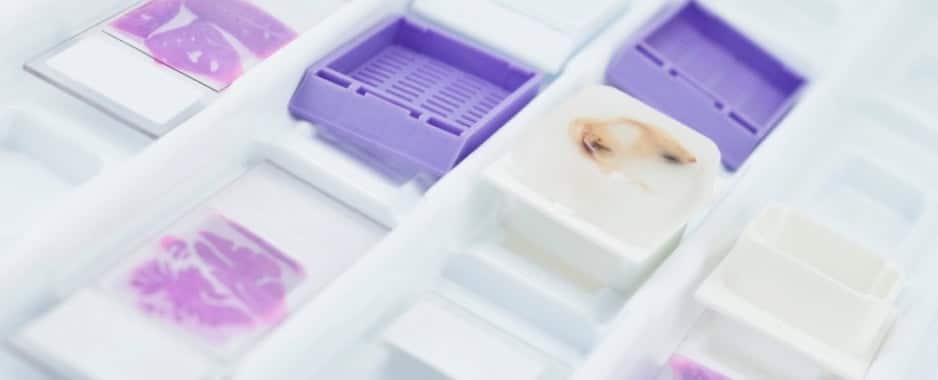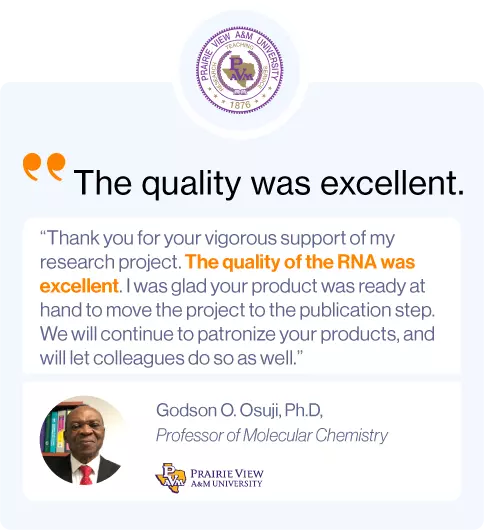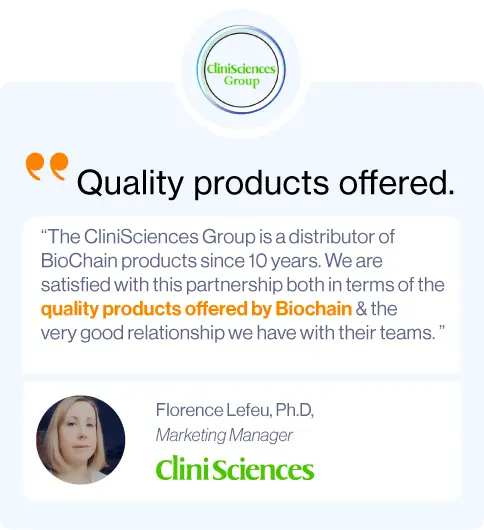- Need assistance?
- 1-888-762-2568
- Contact Us
FFPE Tissue

Contact us now for a quote or additional information
What Are Formalin Fixed Paraffin Embedded Tissues?
FFPE tissues are tissue samples that have experienced processing for paraffin embedding. This process of paraffinization takes the tissue from an aqueous to an organic state, readying it for long-term storage while preserving its cellular structure. FFPE are thus ideal samples for studies requiring historical biodata.
FFPE tissues have a variety of uses due to their different features. Our tissues are mainly used by scientists as controls in comparison studies. For example, if you are studying liver cancer, you need a particular control that has certain markers and genes to balance your intervention or variables of interest.
Customers can use our FFPE tissues as either positive or negative controls. BioChain offers a range of characterized FFPE tissues — that is, tissues that have been labeled and identified according to the specific gene markers they carry. If you are looking for a particular marker in your study, you can use those tissues as positive controls. If a particular gene has not been identified in a tissue, you can use it as a negative control.
Other common applications of our FFPE tissues include:
- Immunohistochemistry — FFPE tissues are excellent for highlighting specific biomarkers.
- Nucleic acid or protein extraction — as with frozen tissue, FFPE tissue is useful for DNA and protein extraction, with the added benefits of stable long-term storage and access to archival tissue and corresponding historical biodata.
- AI modeling — FFPE tissues are useful inputs in AI modeling for virtual comparison studies, as they can carry all of the genetic information of a particular disease (e.g. breast cancer).
BioChain carries a large inventory of human FFPE tissue dating from the 1990s to the present. In addition to human tissue, BioChain also has a sizable inventory of animal FFPE tissue (including monkey, sheep, pig, dog, rat, and mouse), and plant options as well.
Rigorous Quality Control and Standards
At BioChain, we are known for our quality tissue samples. We pride ourselves on living up to that quality for all customers. As a form of quality assurance, our in-house pathologist runs multiple quality tests on the samples and shares the H&E image of the tissue with the customer for approval before sample selection and shipping.
Furthermore, our FFPE tissues contain a wealth of intensive biodata detailing variables such as age, sex, disease status, and date collected. In some cases, comorbidities such as BMI or smoking status are also attached to the tissue.
Storage for Paraffin-Embedded Tissues
BioChain has a large archive of FFPE samples with historical biodata available for use. We also do daily procurement from high-quality and reliable vendors across the globe; in addition to our archive of historical tissue data, we also always have new, freshly procured samples available. Because of FFPE tissues’ stability at room temperature, the cost of shipping is significantly reduced for customers. Furthermore, there is no fear of losing samples in the unlikely event that a shipment is delayed.
Highlighted Features of our FFPE Tissues:
- Tissues from a wide variety of hard-to-obtain tissue sources (e.g. tissue from neurodegenerative diseases like Alzheimer’s; tissue from non-human primates)
- Large archive of tissues available dating back 30 years
- Suitable for both immunohistochemistry and in situ hybridization
- Documentation on tissues’ clinical histories available
- Reduced shipping cost due to paraffin stability at room temperature.
Ask about our matched pair samples and custom tissue procurement services to fit your needs.




Trusted by the top 500 global pharmaceutical, biotechnology and academic
leaders for over 25 years, BioChain's biggest advocates are our customers.

Frequently Asked Questions
What is FFPE tissue?
FFPE tissue refers to biological tissue samples that are preserved by being fixed in formalin and then embedded in paraffin wax. This process helps maintain the structure of the tissue for long-term storage and analysis.
What does FFPE stand for?
FFPE stands for Formalin Fixed Paraffin Embedded, which refers to the process by which the tissue is preserved.
Why are FFPE tissue samples used?
FFPE tissues are prepared in a way that preserves cellular structure and allows long-term storage of your tissue specimens, making them valuable for histological and molecular analysis – especially in cancer research. FFPE tissues can be used for both immunohistochemistry and in-situ hybridization.
How are FFPE tissue samples prepared?
Tissues used in FFPE are fixed in formalin immediately after excision. Later, they are embedded in paraffin wax, which solidifies as it cools. Once this process is complete, the samples can then be subjected to processes such as blocking, sectioning, permeabilization, and antigen revival.
How long can FFPE tissue samples be stored?
FFPE tissue samples can be stored for many years if kept in controlled environmental conditions. Some FFPE samples have been successfully stored and used for decades.
What type of molecular research technologies can be performed with FFPE samples?
FFPE samples are suitable for a wide range of analyses, including histological examination (e.g., H&E staining), immunohistochemistry (IHC), in situ hybridization (ISH), RNA and DNA extractions, spatial genomics and proteomics, molecular techniques like polymerase chain reaction (PCR), and next-generation sequencing (NGS).
Are there alternatives to FFPE for tissue preservation?
Yes, other tissue preservation methods include freezing samples in liquid nitrogen or embedding them in an optimal cutting temperature (OCT) compound. The choice of tissue depends on your specific research or diagnostic needs.
What are the advantages of using FFPE samples over frozen samples?
FFPE samples and frozen samples are both common methods of preserving biological tissues for research and diagnostic purposes. Each method has its advantages and disadvantages; the choice between FFPE and frozen samples always depends on the specific requirements of your study. Some general advantages to using FFPE over frozen tissues include longer-term preservation, tissue archiving, tissue availability, easier tissue handling, and storage, cost-effectiveness, easier shipping due to tissue stability, and compatibility with both IHC and ISH.
What are the challenges of working with FFPE tissues?
Whatever the application, the use of FFPE tissues poses some challenges. FFPE tissues may undergo antigen masking during the process of formalin fixation; antigen retrieval methods are often needed to unmask epitopes and enhance antibody binding in IHC. The process of fixation may also lead to the degradation of nucleic acids and proteins, affecting the overall quality of the tissue and potentially interfering with the success of both IHC staining and DNA and RNA extraction. Fixation can also sometimes cause cross-linking of proteins, making it difficult to extract DNA and RNA.
Other challenges of working with FFPE tissues include fragmentation of nucleic acids, degradation of preserved tissue over time, mild chemical modifications in nucleic acids, and, occasionally, inefficiency of nucleic acid extraction due to the paraffin. Newer techniques and protocols have been developed to overcome these challenges, such as optimization of extraction protocols, or heat-induced epitope removal methods that unmask affected antigens.
How can I extract DNA or RNA from FFPE samples?
Specialized kits and protocols are available for DNA and RNA extraction from FFPE samples. These methods often involve the steps of deparaffinization, digestion, and purification. BioChain offers kits and reagents to extract NA from FFPE samples, including our xTractPure™ line (for DNA and RNA) and the Membrane Protein Extraction Kit to name a few.
Can FFPE samples be used in biomarker discovery?
Yes, FFPE samples are commonly used in biomarker discovery. FFPE samples are particularly useful in cancer testing due to their long shelf-life, as archived specimens can provide valuable historical data.
Can FFPE tissue be used for spatial biology research?
Yes, FFPE tissues can be used for spatial biology research, although fresh-frozen tissues are often preferred. Nevertheless, FFPE tissues are valuable for use in spatial applications such as ISH and Fluorescence ISH, IHC, spatial transcriptomics, and multiplexed imaging.
Are FFPE tissue sections suitable for RNA ISH?
Paraffin-embedded tissue sections are commonly used in histology and pathology, but they may pose challenges for RNA ISH. Paraffin embedding involves the use of wax to preserve tissues for sectioning, and this process can lead to RNA degradation and cross-linking of nucleic acids, making it more difficult to detect RNA molecules.
However, researchers have developed methods to overcome these challenges and perform RNA ISH on paraffin-embedded tissues. These methods often include steps to deparaffinize the tissue sections, retrieve the RNA, and minimize RNA degradation. Additionally, using probes that specifically target the RNA of interest, and optimizing the hybridization conditions can improve the sensitivity and specificity of RNA ISH in paraffin-embedded sections.
In summary, while paraffin-embedded tissue sections may not be the first choice for RNA ISH, with appropriate modifications and optimization of protocols, it is possible to perform RNA ISH on such samples. Researchers should carefully consider the specific requirements of their experiment and may need to experiment with different conditions to achieve optimal results.
What is the role of positively charged slides in FFPE tissues?
Positively charged slides play a crucial role in the preparation and mounting of FFPE tissue sections for various laboratory techniques, including histological and immunohistochemical analyses. The positive charge on these slides is typically provided by a coating of a substance such as poly-L-lysine or aminosilane. Positively charged slides promote strong adhesion, minimize tissue folding and rolling, enhance tissue spreading, improve staining quality, facilitate in situ techniques, and increase uniformity in staining protocols. BioChain uses positively charged slides in its FFPE fixation process.
What is recommended for preventing paraffin sections from falling off the slides In FFPE preparation?
Avoid using any solutions with detergents such as Triton X 100, or Tween 20. These detergents may cause the tissue to fall off the slides.
What is the thickness of matched FFPE tissues for eg-T6235090-PP?
For matched FFPE tissues for eg-T6235090-PP we carry 5 PT slides and 5 PN slides. There is 1 section of 8um thickness on each slide. We ensure high precision and consistency in thickness across all slide types.
What is BioChain’s FFPE fixation protocol?
Our FFPE fixation protocol has the following steps:
- Immediately after excision, fix tissue in 10% formalin for 24 hours
- Move tissue to ethanol for gradient dehydration
- Clear tissues using xylene for transparency
- Dip sample into paraffin wax
- Embed
Does BioChain perform demineralization of tissues?
No demineralization of the tissues is performed.
Does Biochain provide decalcified FFPE bone samples?
Yes, BioChain can provide decalcified FFPE bone samples.
Are the FFPE tissue sections coated with any chemicals like 3-aminopropyltriethoxysilane?
No, the sections have not been coated with anything.
What is the ischemic time for our FFPE samples?
BioChain’s FFPE tissue samples harvested from cancer patients are fixed immediately after harvest. FFPE tissue samples harvested from cadavers are fixed between 12 and 24 hours after harvest.
Does BioChain perform histopathological services under GLP conform conditions?
No, our histopathological services are not performed under GLP conform conditions.
Are the tissue slides labeled with any of the labeling dyes – for example, Fluorescein or Rhodamine?
No, we do not label the sections with any dyes.
Are the samples collected from consented donors and will an IRB certificate be provided on request?
Yes, an IRB certificate can be provided on request for your sample. All samples are collected from informed consented donors.
FFPE Tissue Categories
FFPE Blocks
A block refers to the preservation of one tissue from one donor in paraffin — for example, a block of FFPE breast tissue from “Donor A”. Blocks can be useful in later stages of study, where a high number of sections from one tissue are needed.
BioChain’s repository covers various normal, diseased, and tumor blocks retrieved from animal and human species. Learn more about and shop our FFPE blocks below.
FFPE Panels
A panel contains 6-8 different donors and different tissue types preserved on one slide. Panels are a cost-effective option for customers who need to conduct a quick screening in an IHC study; rather than getting 5 different sections from 5 different donors, you can buy one single panel, and conduct your screening in one sitting.
BioChain’s FFPE Tissue Panels contain a variety of human normal and tumor tissues. Learn more about and shop our FFPE panels below.
FFPE Sections
Sections are shaved from the source block of tissue. Therefore, each section only captures one slice of tissue from one donor. Multiple sections from the same block will all be from the same tissue and donor. Sections are useful for customers in the initial stages of a study, where the whole block is an unnecessary investment. We have found that the standard number of sections required for early-stage research is approximately 5.
BioChain’s FFPE Tissue Sections/Curls are cut at 5-micron thickness from a large selection of normal, diseased, and tumor tissues. Learn more about and shop our FFPE sections below.
FFPE Arrays
Similar to panels, FFPE Arrays include multiple tissues and donors at once. However, where our panels offer only combinations of 6-8 tissues and donors, our arrays can capture anywhere from 30-45 different donors and tissue types. Using arrays, in only two slides you can observe 90 spots, and sometimes combine frozen, FFPE, and FDA-approved tissues for one assay. Arrays are useful for customers who are seeking to identify a high number of biomarkers from a diversity of sources. Rather than using individual sections or even panels, a cost-effective strategy is to use an array.
BioChain’s FFPE Tissue Arrays contain a variety of human normal and tumor tissues, including a selection of FDA TMAs that are available for purchase and use. Learn more about and shop our FFPE tissue arrays below.
Characterized Tissues
Characterized tissues are tissues that have been labeled and identified according to the specific gene markers they carry. Among their many applications, they are useful as controls or verification in genotyping, suitable for both IHC and in-situational hybridization assays, and helpful in the isolation of DNA and RNA with specific mutational properties.
BioChain offers a selection of FFPE tissue samples that have been characterized according to tissue type, age, gene count and expression, NGS, presence of mutations, and other important markers. Our characterized tissue types include HPV, various cancers, and, most recently, spatially characterized tissues. BioChain's cancer gene panels for NGS will help you identify mutations and their hotspots in your research.
Learn more about and shop our characterized tissues below.
FDA Arrays
As a part of our selection of FFPE tissue microarrays, we offer frozen and FFPE samples prepared in accordance with FDA standards. In addition to our in-house high standards for sample preparation, our production team has prepared a selection of FFPE samples following the FDA’s official guidelines, to be used by you in your work as necessary.
If you are conducting biomarker research, drug target validation, or a different study requiring FDA-approved samples, our archive has something for you. Learn more about and shop BioChain’s FDA-approved FFPE tissue samples below.
Need biospecimens from multiple donors?
Reach out to us to customize your project! We offer custom sample procurement, custom frozen and FFPE tissue sectioning and more!

